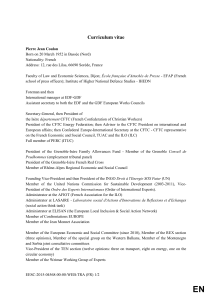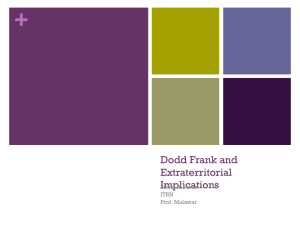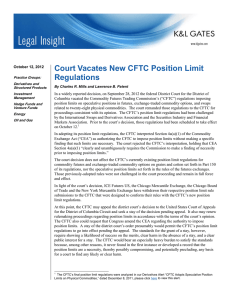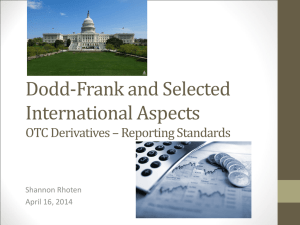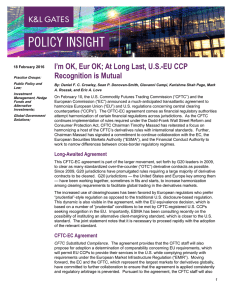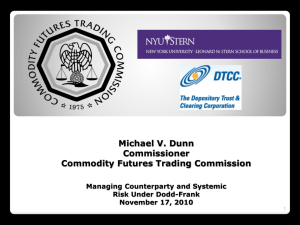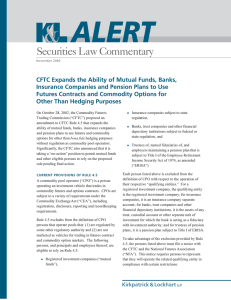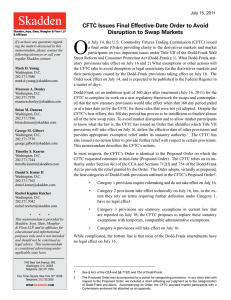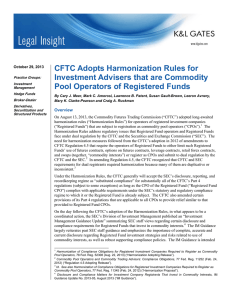Power Struggle? The CFTC/FERC Jurisdictional Split under Dodd-Frank
advertisement
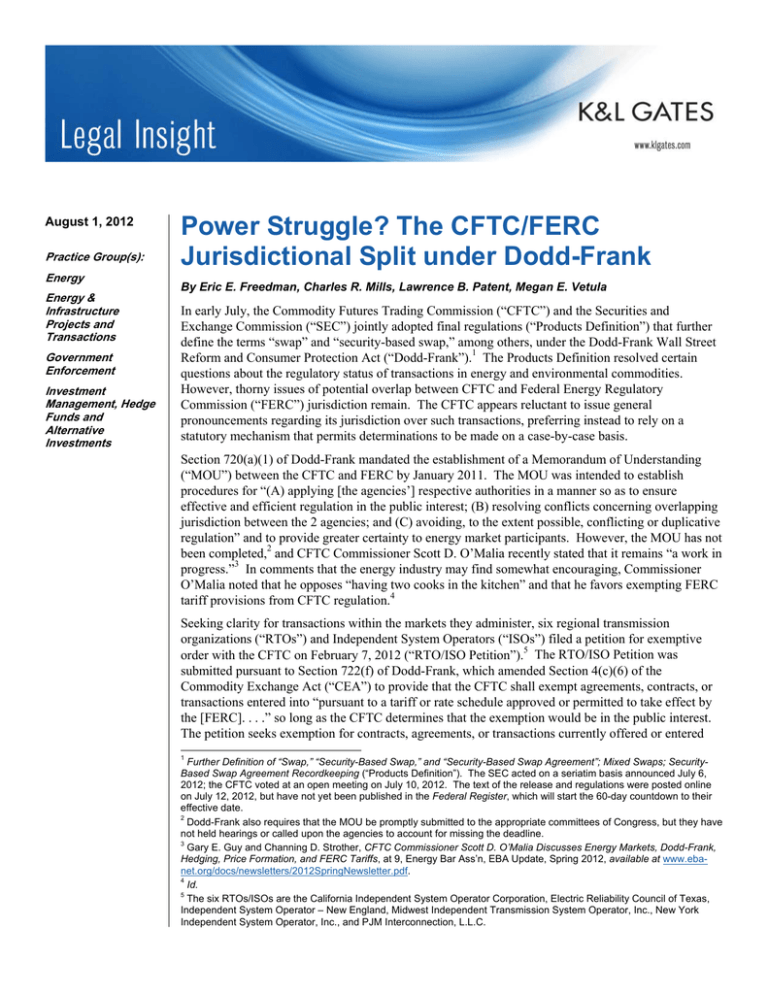
August 1, 2012 Practice Group(s): Energy Energy & Infrastructure Projects and Transactions Government Enforcement Investment Management, Hedge Funds and Alternative Investments Power Struggle? The CFTC/FERC Jurisdictional Split under Dodd-Frank By Eric E. Freedman, Charles R. Mills, Lawrence B. Patent, Megan E. Vetula In early July, the Commodity Futures Trading Commission (“CFTC”) and the Securities and Exchange Commission (“SEC”) jointly adopted final regulations (“Products Definition”) that further define the terms “swap” and “security-based swap,” among others, under the Dodd-Frank Wall Street Reform and Consumer Protection Act (“Dodd-Frank”).1 The Products Definition resolved certain questions about the regulatory status of transactions in energy and environmental commodities. However, thorny issues of potential overlap between CFTC and Federal Energy Regulatory Commission (“FERC”) jurisdiction remain. The CFTC appears reluctant to issue general pronouncements regarding its jurisdiction over such transactions, preferring instead to rely on a statutory mechanism that permits determinations to be made on a case-by-case basis. Section 720(a)(1) of Dodd-Frank mandated the establishment of a Memorandum of Understanding (“MOU”) between the CFTC and FERC by January 2011. The MOU was intended to establish procedures for “(A) applying [the agencies’] respective authorities in a manner so as to ensure effective and efficient regulation in the public interest; (B) resolving conflicts concerning overlapping jurisdiction between the 2 agencies; and (C) avoiding, to the extent possible, conflicting or duplicative regulation” and to provide greater certainty to energy market participants. However, the MOU has not been completed,2 and CFTC Commissioner Scott D. O’Malia recently stated that it remains “a work in progress.”3 In comments that the energy industry may find somewhat encouraging, Commissioner O’Malia noted that he opposes “having two cooks in the kitchen” and that he favors exempting FERC tariff provisions from CFTC regulation.4 Seeking clarity for transactions within the markets they administer, six regional transmission organizations (“RTOs”) and Independent System Operators (“ISOs”) filed a petition for exemptive order with the CFTC on February 7, 2012 (“RTO/ISO Petition”).5 The RTO/ISO Petition was submitted pursuant to Section 722(f) of Dodd-Frank, which amended Section 4(c)(6) of the Commodity Exchange Act (“CEA”) to provide that the CFTC shall exempt agreements, contracts, or transactions entered into “pursuant to a tariff or rate schedule approved or permitted to take effect by the [FERC]. . . .” so long as the CFTC determines that the exemption would be in the public interest. The petition seeks exemption for contracts, agreements, or transactions currently offered or entered 1 Further Definition of “Swap,” “Security-Based Swap,” and “Security-Based Swap Agreement”; Mixed Swaps; SecurityBased Swap Agreement Recordkeeping (“Products Definition”). The SEC acted on a seriatim basis announced July 6, 2012; the CFTC voted at an open meeting on July 10, 2012. The text of the release and regulations were posted online on July 12, 2012, but have not yet been published in the Federal Register, which will start the 60-day countdown to their effective date. 2 Dodd-Frank also requires that the MOU be promptly submitted to the appropriate committees of Congress, but they have not held hearings or called upon the agencies to account for missing the deadline. 3 Gary E. Guy and Channing D. Strother, CFTC Commissioner Scott D. O’Malia Discusses Energy Markets, Dodd-Frank, Hedging, Price Formation, and FERC Tariffs, at 9, Energy Bar Ass’n, EBA Update, Spring 2012, available at www.ebanet.org/docs/newsletters/2012SpringNewsletter.pdf. 4 Id. 5 The six RTOs/ISOs are the California Independent System Operator Corporation, Electric Reliability Council of Texas, Independent System Operator – New England, Midwest Independent Transmission System Operator, Inc., New York Independent System Operator, Inc., and PJM Interconnection, L.L.C. Power Struggle? The CFTC/FERC Jurisdictional Split under Dodd-Frank into under any FERC-approved or Public Utility Commission of Texas-approved tariff under which an RTO/ISO operates. The petition therefore covers financial transmission rights (“FTRs”), certain transactions in the day-ahead or real-time markets, forward capacity transactions, and reserve and regulation transactions, among others. The CFTC has not yet ruled on the petition. In its recent EndUser Release, the CFTC noted that it “intends to act on this petition expeditiously.” End-User Exception to the Clearing Requirement for Swaps, 77 Fed. Reg. 42560, 42580 (July 19, 2012). Speculation abounds that the CFTC staff has recommended that some transactions in organized wholesale electricity markets be exempt.6 CFTC Chairman Gary Gensler has indicated that the staff recommendation “was submitted to the CFTC’s internal network” recently.7 Because the Commissioners may be in the process of reviewing the staff recommendation, a vote could still be weeks away.8 The Products Definition does not address the regulatory status of transactions in RTOs and ISOs (including FTRs and ancillary services), despite requests that it do so from several commenters, including the Staff of the FERC, who urged the CFTC to exclude from the definition of “swap” transactions that are executed or traded on RTOs/ISOs.9 Instead, the Products Definition notes that the status of such transactions will be addressed under the procedures for exemptive relief specified in Section 722 of Dodd-Frank, rather than through rulemaking. The Products Definition does not mention the RTO/ISO Petition specifically. It does state that concerns such as those raised in the petition can be resolved “in connection with any petition for a CEA section 4(c)(6) exemption that may be submitted to the CFTC. Interested parties on all sides of the issue would receive an opportunity to comment on the scope and other aspects of any proposed exemptive relief at that time.”10 Although this contemplated process would appear to function much like a proposed rulemaking in terms of opportunity for public comment, the efficacy of this approach may ultimately turn on the breadth of any exemptions the CFTC grants. Given the complexity of many FERC tariffs, a CFTC exemptive process that resulted in an overlay of many fine distinctions concerning CFTC authority and the application of its rules, in addition to the expenditures of time and resources that such a process for individual relief may entail, could prove daunting to market participants. Interestingly, the Products Definition release indicates that the CFTC may consider that the Product Definition and interim rule governing trade options have already rendered the questions presented in the RTO/ISO Petition concerning embedded options and forward transactions moot by excluding those products from the definition of “swap.”11 The regulation of energy industry transactions under Dodd-Frank is a developing area. Energy market participants should follow the developments described in this Alert and should discuss any questions or concerns with any of the authors or their regular contacts at K&L Gates. 6 Brian Scheid, Some ISO deals may get exemptions: sources, at 2, Electric Power Daily, Platts, (July 26, 2012). Id. 8 Id. 9 Further Definition of “Swap,” “Security-Based Swap,” and “Security-Based Swap Agreement”; Mixed Swaps; SecurityBased Swap Agreement Recordkeeping, Comments of the Staff of the Federal Energy Regulatory Commission (July 22, 2011), File No. S7-16-11, available at http://comments.cftc.gov/PublicComments/ViewComment.aspx?id=47898&SearchText=. 10 Products Definition at p. 201. 11 Id. at pp. 197-98. 7 2 Power Struggle? The CFTC/FERC Jurisdictional Split under Dodd-Frank Authors: Eric E. Freedman eric.freedman@klgates.com +1.206.370.7627 Charles R. Mills charles.mills@klgates.com +1.202.778.9096 Lawrence B. Patent lawrence.patent@klgates.com +1.202.778.9219 Megan E. Vetula megan.vetula@klgates.com +1.202.778.9453 3
